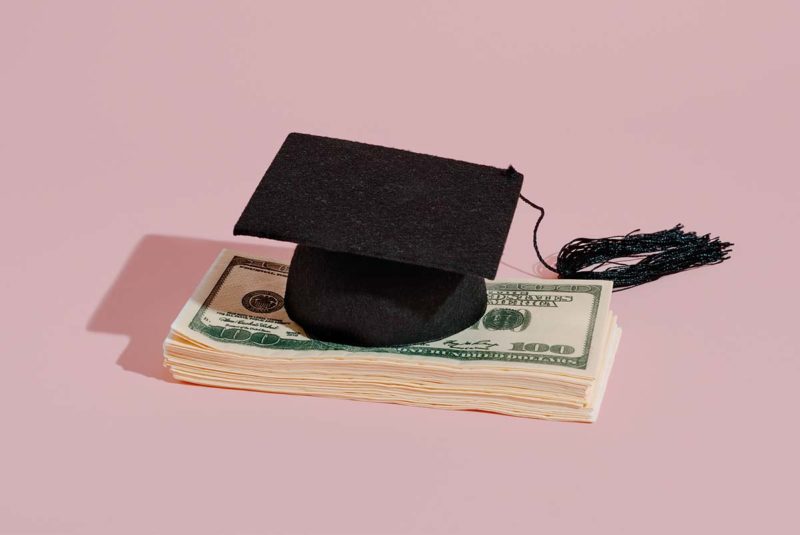You have to spend money to make money, right? That’s certainly how it feels when you’re considering going to college or trade school.
You’ve got to pay to take classes to become qualified to one day work your dream job.
But where does this money come from? Your family certainly can’t be expected to pay for it all. If you need to take out student loans for college, you’re certainly not alone.
According to recent reports, the average student loan debt is $37,693, and there are around 45 million U.S. borrowers with student loan debt.[1]
You can take out federal loans, but sometimes Uncle Sam’s dollars might not be enough or you may not qualify. That’s where private student loans can help.
While private student loans can help fill in the gaps for federal student loans, it’s essential to consider the pros and cons of private loans before applying.
What Is a Private Student Loan?
Like federal student loans, you can use private student loans to pay for your college education. The federal government offers federal student loans; private student loans are offered by banks, credit unions and online lenders.
After maxing out scholarships, grants and federal loan options, many students turn to private loans to cover the rest of their education expenses.
Private Student Loans: FAQs
Understanding student loans can feel as complicated as trying to understand your organic chemistry homework. But don’t worry, we got you.
Who Qualifies for a Private Student Loan?
To be approved for a private student loan, you need to check a couple of boxes, like:
- Having a good credit score (generally, 670 or higher) or having a co-signer with a good credit score
- Having a steady income or having a co-signer with a steady income
Don’t feel bad If you need a co-signer for your private student loan. Most students need that extra assist.
How much can I borrow in private student loans?
Private student loans don’t come with the same limits that federal student loans have.
Currently, you can borrow a total of $57,500 in federal student loans or $12,500 per year if you’re an independent student (aka mom and dad aren’t claiming you as a dependent on their tax returns).
If you’re a dependent, the amount you can borrow in federal loans is even smaller ($7,500 per year), with a maximum limit of $31,000.[2]
Private student loans max out at the cost of your college’s total tuition, minus what you received in financial aid and federal loans.
So let’s say your total college tuition costs $80,000, and you maxed out the federal loan amount of $57,500. This means you’re eligible to take out $22,500 in private student loans.
What is the interest on private student loans?
Typically, private loans come with higher interest rates than federal loans. Having a good credit score (or a co-signer with a good credit score) is the best way to qualify for a lower interest rate.
Generally speaking, private student loan interest rates range from 1% to 13%. Federal student loans tend to offer better interest rates, with the average rate ranging from 2.75% to 5.3%.
If you apply for a private loan and don’t get the interest rate you were hoping for, you could qualify for a lower rate down the road by refinancing. Refinancing involves having your private lender pay off your current loans and then giving you a new loan with a lower interest rate and better repayment term.
Pros of Private Student Loans
So why should you consider taking out a private student loan? Most students use private loans to cover the portion of tuition that their federal loans don’t.
But there are some unique advantages of private student loans that you should consider:
Pro: Higher borrowing limits
If you’re experiencing restrictions due to federal loan caps, a private loan can help you fill in the gaps. Depending on your degree, private student loans can cover up to 100% of your cost of attendance.
Pro: Put your excellent credit score to use
The federal government doesn’t take your credit score into account when you apply for their loans. Instead, Congress sets the interest rate, and it’s the same for everyone, regardless of credit score.
For the 2020 – 2021 school year, the federal student loan interest rate was set at 2.75%.[3] While this is a historically low rate, you might qualify for an even lower rate with a private loan if you have excellent credit.
Pro: Flexible borrowing options
If you’ve already filled out a FAFSA (Free Application for Federal Student Aid form), then you know how stringent the application process can be. Because federal student loans are need-based, the government wants to make sure its money is going to the students who need it the most.
Private student loans aren’t based on need. As long as you meet the income, credit and other qualifications set by the lender, you can borrow a private loan.
Federal student loans only offer fixed interest rates, but most private lenders also offer variable interest rates in addition to fixed interest rates.
As a student, you may find variable interest rates beneficial if you’re looking to save money upfront. Just keep in mind that your interest rate could rise in the future.
Cons of Private Student Loans
Of course, there are downsides to private student loans that you need to consider as well. There are reasons for limiting the amount you borrow in private student loans.
Here’s what to consider:
Con: You need good credit
While the credit score requirement is an advantage for some students, for others it’s a drawback.
The average private loan interest rate falls between 1% and 13%, skewing towards the higher rates if your credit score is below 670.
That would make your private student loan interest rates much higher than your interest rates for federal loans.
Interest rates are something that students often overlook when taking out loans, but they are one of the most crucial factors to consider. Your interest rate largely determines how much you’ll need to pay back once you graduate.
Con: Fewer forgiveness and repayment options
Let’s say you’ve graduated, you can’t find a job and you’re struggling to make ends meet. If you have a federal student loan, there are government-backed programs you can pursue to make your debt more manageable.
You can apply for an income-driven repayment plan, which will adjust your monthly payments to 10 – 20% percent of your total income. These plans also forgive remaining debt after 20 to 25 years of qualifying repayment.
There are also more forgiveness and repayment options available, depending on the career path you choose.
- If you’re a special education teacher who teaches in a low-income school district, you may qualify for the Teacher Loan Forgiveness program
- If you plan on becoming a doctor, check out the Association of American Medical Colleges‘ website. You’ll find a list of loan assistance repayment programs by state
Private student loans don’t have these options, so it’s essential to consider your career choice when applying.
Con: Variable interest rates may not save you money
While it can initially be a benefit, variable interest rates can increase over time, making them a con, too. If the interest rate rises, so will your monthly payments, making it difficult for you to budget for the future.
With the fixed interest rate of federal loans, you’ll know exactly how much you owe each month.
Con: Interest adds up while you’re still in school
With private loans, interest starts adding up while you’re still in school. That doesn’t happen with unsubsidized federal loans.
To prevent this interest from building up and owing more down the road, it’s a good idea to pay on the interest while you’re still in college.
If you’re a college student on a tight budget and a ramen noodle diet, making those interest payments while you’re in school may be challenging, leading to higher costs for you down the road.
Con: Private loans aren’t always discharged after death
Yes, it can be scary to think about death when you’re young and still have your whole life ahead of you, but the discharge policies on loans are essential to keep in mind.
If you were to take out a federal student loan and pass away, no one would be responsible for paying them back.
Private loans don’t come with this condition. Your family wouldn’t be responsible for paying back your loans, but your lender could gain control of your possessions to cover the cost of the loan. So if you had a car you planned to leave to a family member, your private loan lender could potentially take your car to cover the remaining value of your loan.
Con: The not so gracious grace period
Like federal student loans, private student loans also offer a grace period, which means you don’t need to pay on your loans until after you graduate. In some cases, the grace period extends 6 months or more until after you graduate.
So…Are Private Student Loans the Answer?
| Pros of Private Student Loans | Cons of Private Student Loans |
| Higher borrowing limits Puts your good credit score to use Flexible borrowing options | Limited options for those with bad credit Fewer forgiveness and repayment options Variable interest rates may cost you more money in the long run Loans aren’t discharged after death Inflexible grace period |
While they provide some unique benefits, overall, federal student loans are the better option because of their consistent interest rates, lack of financial qualifications, and forgiveness options. After you’ve exhausted all of your other options, you can look into applying for private student loans.
The Short Version
- In addition to federal loans, many students take out private loans to help pay for college
- Private loans work differently from federal loans and come with some unique advantages – and disadvantages
- Understanding how private loans work will help you choose the best college loan option for you
Education Data Initiative. “Average Student Loan Debt.” Retrieved December 2021 from https://educationdata.org/average-student-loan-debt
Federal Student Aid Information Center. “The U.S. Department of Education offers low-interest loans to eligible students to help cover the cost of college or career school.” Retrieved December 2021 from https://studentaid.gov/understand-aid/types/loans/subsidized-unsubsidized
Federal Student Aid Information Center. “Understand how interest is calculated and what fees are associated with your federal student loan.” Retrieved December 2021 from https://studentaid.gov/understand-aid/types/loans/interest-rates




